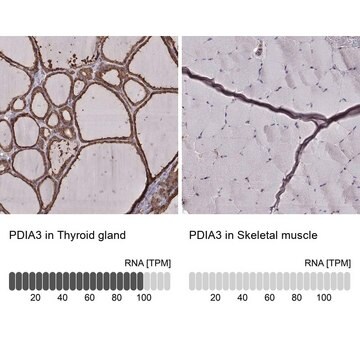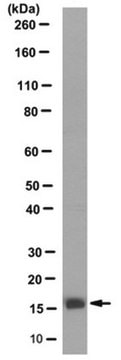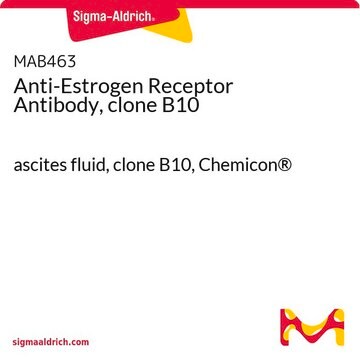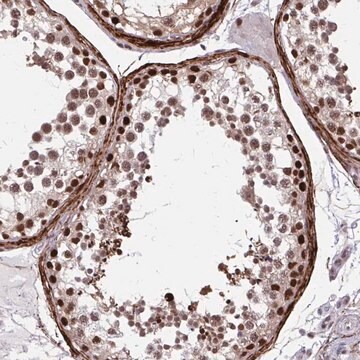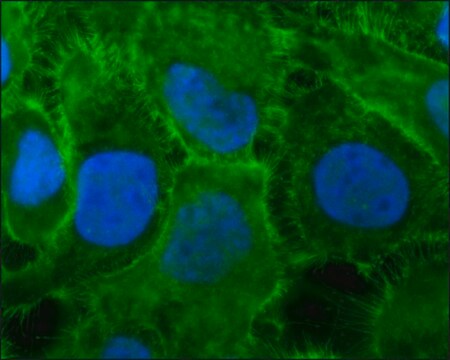MABC949
Anti-Glycoprotein 78 Antibody, clone 3F3A
clone 3F3A, from rat
Synonyme(s) :
E3 ubiquitin-protein ligase AMFR, AMF receptor, Autocrine motility factor receptor, gp78, RING finger protein 45
About This Item
Produits recommandés
Source biologique
rat
Niveau de qualité
Forme d'anticorps
purified immunoglobulin
Type de produit anticorps
primary antibodies
Clone
3F3A, monoclonal
Espèces réactives
mouse, human
Technique(s)
immunocytochemistry: suitable
immunohistochemistry: suitable
western blot: suitable
Isotype
IgMκ
Numéro d'accès NCBI
Numéro d'accès UniProt
Conditions d'expédition
ambient
Modification post-traductionnelle de la cible
unmodified
Informations sur le gène
human ... GPR78(27201)
Description générale
Spécificité
Immunogène
Application
Affects Function: A representative lot stimulated the mobility of B16-F1 mouse melanoma cells on colloidal gold-coated surface (Nabi, I.R., et al. (1990). Cancer Res. 50(2):409-414).
Immunocytochemistry Analysis: A representative lot detected both surface and cytoplasmic gp78 immunoreactivity by fluorescent immunocytochemistry staining of intact or MeOH/3% paraformaldehyde-fixed and 0.5% Triton X-100-permeablized mouse A31 fibroblasts and A31M angiosarcoma cells (Niinaka, Y., et al. (1998). Cancer Res. 58(12):2667-2674).
Immunocytochemistry Analysis: Clone 3F3A ascites fluid immunolocalized gp78 on the surface of adherent B16-F1 mouse melanoma cells by fluorescent immunocytochemistry staining of 3% paraformaldehyde-fixed cells (Nabi, I.R., et al. (1990). Cancer Res. 50(2):409-414).
Immunohistochemistry Analysis: A representative lot detected an elevated gp78 immunoreactivity in frozen mammary gland sections from 235RLF transgenic mice than age-matched wild type mice (Joshi, B., et al. (2010). J. Biol. Chem. 285(12):8830-8839).
Western Blotting Analysis: A representative lot detected shRNA-mediated gp78 downregulation in HT-1180 human fibrosarcoma cells (Fu, M., et al. (2013). Mol. Biol. Cell. 24(8):1153-1162).
Western Blotting Analysis: A representative lot detected endogenous gp78 and gp78 transgene expression in mammary glands from wild-type and transgenic mice. Clone 3F3A detected a higher gp78 expression in metastatic MDA-435 cells than in non-metastatic MCF7 breast carcinoma cells (Joshi, B., et al. (2010). J. Biol. Chem. 285(12):8830-8839).
Western Blotting Analysis: A representative lot detected much higher gp78 expression in angiosarcoma (human HT-1180 and mouse A31M) than in fibroblast (human IMR90 and mouse A31) lines (Niinaka, Y., et al. (1998). Cancer Res. 58(12):2667-2674).
Western Blotting Analysis: A representative lot detected gp78 and a ~150 kDa band in B16-F1 mouse melanoma cell extract. Autocrine motility factor (AMF) competed against clone 3F3A for binding the gp78 target band. Cell extract sialidase treatment decreased the antibody′s immunoreactivity toward gp78 and abolished ~150 kDa band detection (Nabi, I.R., et al. (1990). Cancer Res. 50(2):409-414).
Apoptosis & Cancer
Qualité
Description de la cible
Forme physique
Stockage et stabilité
Handling Recommendations: Upon receipt and prior to removing the cap, centrifuge the vial and gently mix the solution. Aliquot into microcentrifuge tubes and store at -20°C. Avoid repeated freeze/thaw cycles, which may damage IgG and affect product performance.
Autres remarques
Clause de non-responsabilité
Vous ne trouvez pas le bon produit ?
Essayez notre Outil de sélection de produits.
Code de la classe de stockage
12 - Non Combustible Liquids
Classe de danger pour l'eau (WGK)
WGK 2
Point d'éclair (°F)
Not applicable
Point d'éclair (°C)
Not applicable
Certificats d'analyse (COA)
Recherchez un Certificats d'analyse (COA) en saisissant le numéro de lot du produit. Les numéros de lot figurent sur l'étiquette du produit après les mots "Lot" ou "Batch".
Déjà en possession de ce produit ?
Retrouvez la documentation relative aux produits que vous avez récemment achetés dans la Bibliothèque de documents.
Notre équipe de scientifiques dispose d'une expérience dans tous les secteurs de la recherche, notamment en sciences de la vie, science des matériaux, synthèse chimique, chromatographie, analyse et dans de nombreux autres domaines..
Contacter notre Service technique